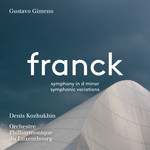|
Back
05/20/2020
César Franck: Symphony in D minor, FWV 48 [1] – Symphonic Variations FWV 46 [2]
Denis Kozhukhin (piano), Orchestre Philharmonique du Luxembourg, Gustavo Gimeno (conductor)
Recording: Philharmonie Luxembourg (July 2019 [1] and November 2019 [2]) – 54’01
Hybrid SACD Pentatone PTC 5186 771 (Distributed by Naxos of America) – Booklet in English, German and French

   
“I dared much, but next time, you will see, I will dare even more...” César Franck (1889)
Despite César Franck’s assertive optimism towards his Symphony in D minor, the public remained aloof...perhaps a rashly abrasive reaction since Franck’s plucky courageousness was remarkably seasoned. Furthermore, Pentatone’s release, companioned by the earlier Symphonic Variations (1885), showcases two of the composer’s most indelible jewels. And although the Belgian gets relatively few “nods” these days, his compositions are made more liquidly absorbent via confluences of pianist Denis Kozhukhin and the Orchestre Philharmonique du Luxembourg. Gustavo Gimeno’s approach is inherently deliberate and cautious, allowing Franck’s music to engulf broad penetrations.
Wagnerian in realm, strong lines arch back to Der Ring des Nibelungen when reaching into the Symphony. The first movement gives luscious affirmation to the strings as it breathes richness and deliberation.
The most enchanting and atmospheric passage segues into the middle “Allegretto” with its Medieval minstrel-like qualities. Therein lies a distantly hopeful veil, set against the Philharmoniques’s string pizzicati, drawing upon discreet capitulations of the Christian faith and its refrain, "Rejoice, rejoice" from the metrical hymn, “O Come, O Come Emmanuel”...an unsurprising move for César Franck since he was awash in Catholic devotion! Highly cohesive! Critics abhorred the anachronistic English horn, though this instrument gives the moment a more attuned and haunting perspective. Pull back the curtain of quasi-scherzo (3’46) and we find M. Gimeno giving the segment a thorough “cleansing”, elevating the artistic horizons Franck set forth. It’s the most musically-compassionate passage inside the Symphony.
This is brilliantly contrasted with the more forward-leaning “Allegro non troppo”, though it tussles back to its predecessor. M. Gimeno takes advantage of fine tuning César Franck’s “cyclic” form with melodic “turn backs” and with remarkable clarity. “Pulling together all the loose threads” epitomizes the conclusion. We even sense an aura of Franck’s pupil, Gabriel Pierné in this positive summation. All in all, we learn much of César Franck’s persona: polite, sincere, soft-spoken, good-natured.
Franck’s earlier work, Symphonic Variations, houses a vibrantly textured landscape in which Denis Kozhukhin sets up a confrontation between piano and orchestra in credible fashion...evident tension ensues. Appealing more as a piano concerto, this one is consistent: so, too, does M. Kozhukin take a very intentional and pensive route into Franck’s music. The listener’s imagination is guided by the pianist’s persuasion…never overdrawn, yet highly conversant. [Even inside “Variation III” we hear distant parlances of Saint-Saëns’ “Organ” Symphony]. The journey from variation to variation is a grand gem: smoothly connected and invigorating.
The music demonstrates how well-balanced the [keyboard] soloist can match up against strings, particularly in the lengthier “A tempo”...Denis Kozhukhin exudes ominous billowiness of equilibrium. The passage nicely “bridges” into a three-tiered “Finale” that, firstly, bursts of breezy optimism ["Allegro non troppo”], but the fleeting penultimate and the finale's ultimate bars show a “freer” Franck through M. Kozhuhkin’s warmth. In an unusual move, the gait turns to brushy effervescences, so swishy that the remarks are exceedingly pleasing. Frothy! A delightful ending with quasi-Gottschalk spontaneity...perhaps the dare was even there!
A lot of care has been taken into depicting César Franck’s music with discerning credibility. It succeeds and provides a bright light on the composer. Strongly recommended.
Christie Grimstad
|